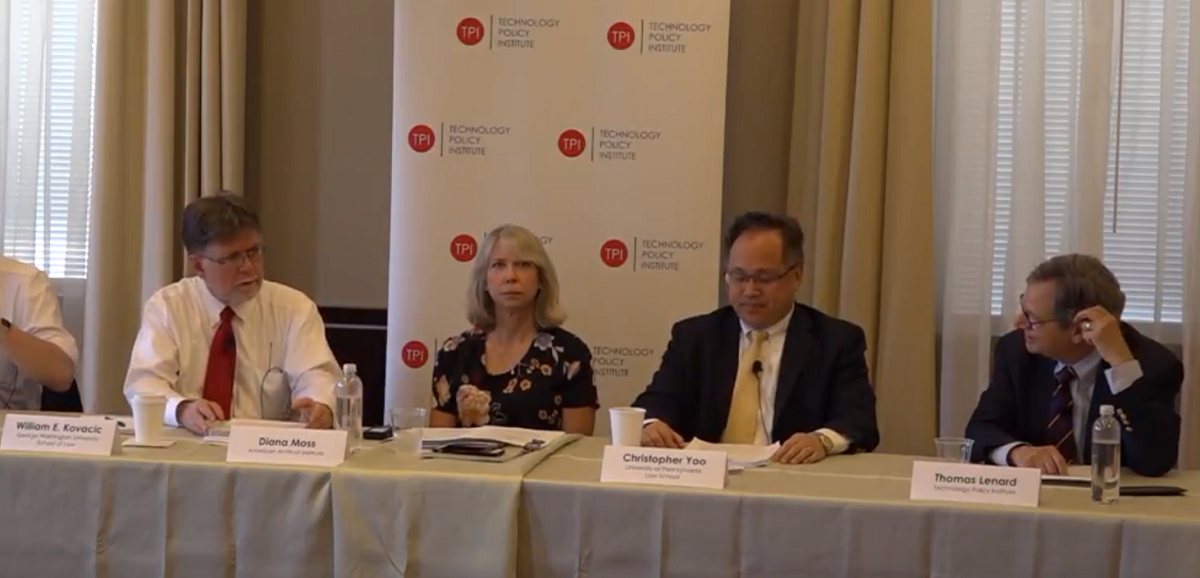At Technology Policy Institute Panel on AT&T/Time Warner, a Criticism of Trump and Law Enforcement
WASHINGTON, June 25, 2018 – The former chairman of the Federal Trade Commission on Tuesday sharply criticized the president and his Justice Department’s antitrust division for promoting certain outcomes in recent antitrust actions. At a Technology Policy Institute panel on the AT&T/Time Warner merge

WASHINGTON, June 25, 2018 – The former chairman of the Federal Trade Commission on Tuesday sharply criticized the president and his Justice Department’s antitrust division for promoting certain outcomes in recent antitrust actions.
At a Technology Policy Institute panel on the AT&T/Time Warner merger, antitrust experts split over whether the AT&T Time Warner merger was good news or bad news for the market, but largely agreed that political officials attempting to influence merger enforcement was detrimental to the public rule of law.
“It diminishes their credibility,” said William Kovacic, a former FTC chairman under President George W. Bush, and now a professor of law and policy at George Washington University Law School.
“Pointing the figures at enforcement officials saying you should block this, or the president of the United States saying this is what you should do,” he said. “Do you know how that’s perceived outside the country? Badly.”
AT&T/Time Warner merger turned traditional politics on its head
AT&T proposed a $85 billion bid to merger with Time Warner in October 2016. Despite the fact that Republicans generally favor deregulatory policies and are therefore generally more receptive to mergers deals, Trump spoke out against the AT&T-Time Warner deal even in 2016, reportedly saying that “AT&T is buying Time Warner and thus CNN, a deal we will not approve in my administration because it’s too much concentration of power in the hands of too few.”
But Trump’s public statements about the merger largely focused on his criticism of a perceived liberal emphasis. That led to accusations that Trump was interfering in a merger analysis and investigation by his Justice Department.
On June 12, U.S District Judge Richard Leon approve the AT&T/Time Warner merger.
Kovacic said that if Leon had blocked the merger, the credibility of law enforcement could have been jeopardized.
“If the result of the case coincides with the urgings of the political official, then “the assumption is that you are the puppet of the elected official,” Kovacic said. “It’s really damaging.”
Christopher Yoo and Diana Moss weighed in on the decision, too
Another academic also praised Leon’s merger decision, praising the “fact-based” ruling for its “discipline” in certain issues, such as placing real evidence over theories of potential harm.
“We all know the law over the last 50 years has become much more hospitable to vertical integration,” said Christopher Yoo , a law professor at the University of Pennsylvania, referencing multiple vertical mergers in the past that he said gave the court real examples to draw “actual record evidence.”
But Diana Moss, president of the American Antitrust Institute, said that future defendants and prosecutors would likely not look towards the AT&T/Time Warner case as an example for multiple reasons.
It did not say anything about law or economics, Moss said, and it was “riddled with all sorts of inconsistencies, errors, and misunderstandings about antitrust.”
Moss, by contrast, criticized Judge Leon, calling his attitude “a stingy uncharitable treatment of plaintiff’s evidence” versus a “wholesale lovefest embracement of the defendant’s claims.”
“You could not see a more stark contrast between the treatment of plaintiff’s evidence and theories versus the defendant,” Moss said.
In regard to how the case will affect future vertical merger cases such as a possible acquisition of Fox by Comcast or Disney, Yoo said:
“The judge thinks they control the meaning of the case. It’s actually later judges.”
A link to the video of the panel is available here.








